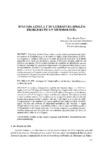Mostrar o rexistro simple do ítem
Segunda lengua y su literatura (Inglés): problemática y metodología
| dc.contributor.author | Ramón Sales, Elisa | |
| dc.contributor.author | Sánchez Hernández, Purificación | |
| dc.contributor.author | Aguado Giménez, Pilar | |
| dc.date.accessioned | 2011-07-13T11:37:28Z | |
| dc.date.available | 2011-07-13T11:37:28Z | |
| dc.date.issued | 2003 | |
| dc.identifier.citation | Lenguaje y textos, 2003, 20: 117-126. ISSN: 1133-4770 | es_ES |
| dc.identifier.issn | 1133-4770 | |
| dc.identifier.uri | http://hdl.handle.net/2183/8189 | |
| dc.description.abstract | [Resumen] Programar de forma homogénea y con los mismos parámetros las distin-tas opciones de Segunda Lengua y su Literatura: Inglés en las Licenciaturas de filolo-gía Hispánica y Filología Francesa es un tarea difícil de llevar a cabo. Ni la funda- mentación ni las bases son las mismas, aunque el Ministerio las haya unificado con idénticos descriptores. En este trabajo ponemos de manifiesto las dificultades surgidas al intentar programar la asignatura y presentamos dos planteamientos distintos para su programación. El primero corresponde a una metodología integrada (la lengua se enseña a través de los textos literarios) para alumnos con un conocimiento de lengua inglesa avanzado y el segundo, a una metodología no integrada (la lengua y la litera- tura forman dos bloques claramente delimitados) para alumnos con un nivel menor de conocimientos de lengua inglesa. | es_ES |
| dc.description.abstract | [Abstract] To design a homogeneous syllabus for Segunda lengua y su literatura: Inglés, in French Philology and Spanish Philology is a complex task when we have to share the same parameters as it is indicated in the official descriptors of the Ministry of Education for all the Segunda lengua y su literatura subjects. The students enrolled in these academic degrees show a different point of departure which enhances the dif- ficulties in designing a proper syllabus. The aim of this paper is to present two diffe- rent approaches to the methodology used to teach the same subject in these two philo- logies. The first one proposes an integrated methodology (the language is taught through literary texts) and is intendedfor students with an upper-intermediate/advan- ced knowledge ofthe English language. The second, comprises a non-integrated met- hodology (language and literature are two completely separated fields of study), for students with a lower level of English | es_ES |
| dc.language.iso | spa | es_ES |
| dc.publisher | Universidade da Coruña | es_ES |
| dc.title | Segunda lengua y su literatura (Inglés): problemática y metodología | es_ES |
| dc.type | info:eu-repo/semantics/article | es_ES |
| dc.rights.access | info:eu-repo/semantics/openAccess |






